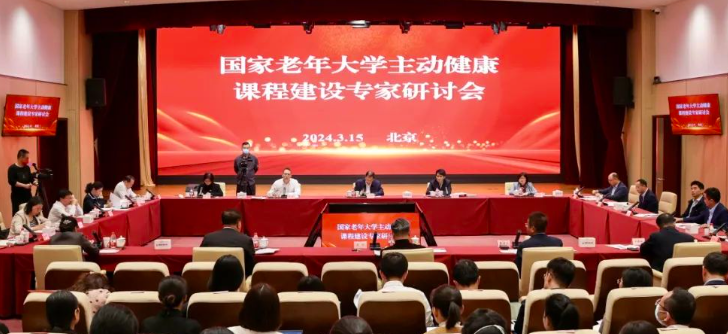 On 15 March 2024, the Seniors University of China (SUC) hosted an expert seminar focused on the development of proactive health courses.
On 15 March 2024, the Seniors University of China (SUC) hosted an expert seminar focused on the development of proactive health courses.
This seminar aimed to implement the directives outlined in the SUC's establishment plan and to initiate discussions regarding the creation of these health-focused courses. Eleven experts participated in the seminar, including notable figures such as Wang Qi, an academician of the Chinese Academy of Engineering and lifelong professor at Beijing University of Chinese Medicine; Zhu Liguo, an academician of the Chinese Academy of Engineering and chief researcher at the China Academy of Chinese Medical Sciences; Cao Hongxin, executive vice president and professor at the China Academy of Chinese Medical Sciences; and Professor Gu Xiaohong, chair of the Teaching Guidance Committee of Traditional Chinese Medicine at the Ministry of Education. The event was presided over by Wang Qiming, secretary of the Party Committee and president of the Open University of China (OUC, also known as SUC).

Wang Qiming introduced the achievements of the SUC in its inaugural year and the ongoing efforts to propel the three-year action plan for the SUC's development. He underscored the strategy for accelerating the creation of high-quality, proactive health courses. He emphasised the importance of maintaining the courses’ positioning as delivered by renowned doctors and educators, aiming to develop premier and notable courses for proactive health education in China. Furthermore, he stressed the necessity to adhere to a systematic, comprehensive, and full-chain curriculum to establish a course system founded on the principle of "prevention first, combined prevention and treatment, and giving equal importance to Chinese and Western medicine." Additionally, he highlighted the need to follow the course objectives, guided by Chinese culture and traditional Chinese medicine (TCM), to promote the culture of Chinese medicine, broaden the knowledge of Chinese medicine and health, and inspire the elderly to develop a deeper appreciation for the fine traditional culture of the Chinese nation.
Academician Wang Qi has emphasised the importance of addressing "three key issues" in the context of proactive health: clarifying the positioning, identifying the core advantages, and leveraging the unique role of Traditional Chinese Medicine (TCM). Concurrently, he advocates for the establishment of "three systems" — an education system, a service system, and a network system. These are designed to enable the elderly to better understand TCM knowledge and cultivate a mindset geared towards proactive health.
Academician Zhu Liguo has proposed that the establishment of proactive health courses should follow a philosophy that centres on the elderly, taking advantage of the unique benefits Traditional Chinese Medicine (TCM) offers in preventive treatment of diseases and prevention of epidemic diseases. These courses aim to disseminate knowledge of TCM among the elderly, covering topics such as health preservation, safe medication practices, prevention management, and safe nursing.
The experts also recommended the development of proactive health courses designed with the educational principle of "cultivating virtue, pursuing lifelong learning, proactively maintaining health, embracing a joyful life, and achieving positive accomplishments" at their core. These courses aim to empower the elderly with knowledge of Traditional Chinese Medicine (TCM), enabling them to understand, apply, and enjoy its benefits. The focus should be on creating a curriculum system centered around health preservation in the elderly, as well as common and stubborn diseases encountered in old age, while popularizing TCM's most frequently used methods. Additionally, they highlighted the importance of establishing a comprehensive framework for proactive health education, encompassing curriculum design, teaching materials, faculty, and platforms.
Song Chunsheng, chief researcher at the China Academy of Chinese Medical Sciences; Tang Zhishu, vice president of the Academy and dean of the Graduate School; along with other experts and scholars, attended the meeting. Leadership from the OUC (SUC) was fully present, including all members of the SUC construction work steering group office and the Seniors College.
By OUC